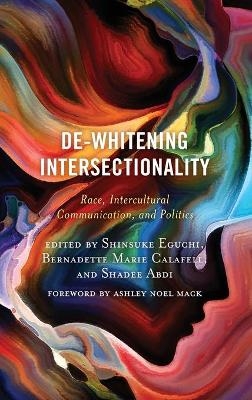
De-Whitening Intersectionality
Lexington Books (Verlag)
978-1-4985-8822-5 (ISBN)
De-Whitening Intersectionality: Race, Intercultural Communication, and Politics re-evaluates how the logic of color-blindness as whiteness is at play in the current scope of intersectional research on race, intercultural communication, and politics. Calling for a re-centering of difference by exploring the emergence and inception of intersectionality concepts, the coeditors and contributors distinguish between the uses of intersectionality that seem inclusive versus those that actually enact inclusion by demonstrating how to re-conceptualize intersectionality in ways that explicate, elucidate, and elaborate culture-specific and text-specific nuances of knowledge for women of color, queer/trans-people of color, and non-western people of color who have been marked as the Others. As a feminist of color tradition, intersectionality has been appropriated through increasing popularity in the discipline of communication, undermining efforts to critique power when researchers reduce the concept to a checklist of identity markers. This book underscores that in order to play well with and illustrate a nuanced understanding of intersectionality; scholars must be attentive to its origins and implications.
Shinsuke Eguchi is associate professor in the Department of Communication and Journalism at the University of New Mexico. Bernadette Marie Calafell is inaugural department chair and professor of critical race and ethnic studies at Gonzaga University. Shadee Abdi is assistant professor of communication in the Department of Communication Studies at San Francisco State University.
Foreword
Ashley Mack, Louisiana State University
Introduction: De-Whitening Intersectionality in Intercultural Communication
Bernadette Marie Calafell, Gonzaga University
Shinsuke Eguchi, University of New Mexico
Shadee Abdi, San Francisco State University
Section I: The Politics of Theorizing
Chapter 1: Intersectionalities in the Fields of Chicana Feminism: Pursuing Decolonization through Xicanisma’s “Resurrection of the Dreamers”
Michelle A. Holling, California State University, San Marcos
Chapter 2: Lethal Intersections and “Chicana Badgirls”
Jaelyn deMaría, University of New Mexico
Chapter 3: Black Feminist Thought, Intersectionality, and Intercultural Communication
Aisha Durham, University of South Florida
Chapter 4: Intersectional Assemblages of Whiteness: The Case of Rachel Dolezal’s Whiteness
Dawn Marie McIntosh, Independent Scholar
Chapter 5: Doing intersectionality under a different name: The (un)intentional politics of refusal
Santhosh Chandrashekar, University of Denver
Section II: Personal Narratives
Chapter 6: Fighting Against Erasure: Making Space for Queer Chicanas
Bernadette Marie Calafell, Gonzaga University
Chapter 7: A Local Gay Man/Tongzhi or A Transnational Queer/Qu-er/Kuer: (Re)organizing My
Queerness and Asianess through Personal Reflection
Andy Kai-chun Chuang, LaGuardia Community College
Chapter 8: What are you?: Embodying and Storying Categorical Uncertainty
Benny LeMaster, Arizona State University
Amber Johnson, St. Louis University.
Miranda Olzman, University of Denver
Chapter 9: Bodies that Collide: Feeling Intersectionality
Sachi Sekimoto, Minnesota State University, Mankato
Chris Brown, Minnesota State University, Mankato
Justin Rudnick, Minnesota State University, Mankato
Chapter 10: Microaggressions in Flux: Whiteness, Disability and Masculinity in Academia
Hannen Ghabra, Kuwait University
Shahd Al Shammari, Kuwait University
Section III: Transnational Circumferences
Chapter 11: Remembering Julia de Burgos: Faithful Witnessing through a Decolonial Feminist Performance
Sara Baugh, Agnes Scott College
Chapter 12: De-Whitening Intersectionality through Transfeminismo
Raquel Moreira, Graceland University
Chapter 13: Dark Looks: Sensory Contours of Racism in India
Pavi Prasad, California State University, Northridge
Anjana Raghavan, Sheffield Hallam University
Chapter 14: “We had to sink or swim”: Privileging racialized ethnic identifications among Asians and Asian Americans
Yea-Wen Chen, San Diego State University
Chapter 15: Crazy Sexy Asian Men!: Masculinities in Crazy Rich Asians
Zhao Ding, Gustavus Adolphus College
Kamela Rasmussen, University of New Mexico
Foreword
Ashley Mack, Louisiana State University
Introduction: De-Whitening Intersectionality in Intercultural Communication
Bernadette Marie Calafell, Gonzaga University
Shinsuke Eguchi, University of New Mexico
Shadee Abdi, San Francisco State University
Section I: The Politics of Theorizing
Chapter 1: Intersectionalities in the Fields of Chicana Feminism: Pursuing Decolonization through Xicanisma’s “Resurrection of the Dreamers”
Michelle A. Holling, California State University, San Marcos
Chapter 2: Lethal Intersections and “Chicana Badgirls”
Jaelyn deMaría, University of New Mexico
Chapter 3: Black Feminist Thought, Intersectionality, and Intercultural Communication
Aisha Durham, University of South Florida
Chapter 4: Intersectional Assemblages of Whiteness: The Case of Rachel Dolezal’s Whiteness
Dawn Marie McIntosh, Independent Scholar
Chapter 5: Doing intersectionality under a different name: The (un)intentional politics of refusal
Santhosh Chandrashekar, University of Denver
Section II: Personal Narratives
Chapter 6: Fighting Against Erasure: Making Space for Queer Chicanas
Bernadette Marie Calafell, Gonzaga University
Chapter 7: A Local Gay Man/Tongzhi or A Transnational Queer/Qu-er/Kuer: (Re)organizing My
Queerness and Asianess through Personal Reflection
Andy Kai-chun Chuang, LaGuardia Community College
Chapter 8: What are you?: Embodying and Storying Categorical Uncertainty
Benny LeMaster, Arizona State University
Amber Johnson, St. Louis University.
Miranda Olzman, University of Denver
Chapter 9: Bodies that Collide: Feeling Intersectionality
Sachi Sekimoto, Minnesota State University, Mankato
Chris Brown, Minnesota State University, Mankato
Justin Rudnick, Minnesota State University, Mankato
Chapter 10: Microaggressions in Flux: Whiteness, Disability and Masculinity in Academia
Hannen Ghabra, Kuwait University
Shahd Al Shammari, Kuwait University
Section III: Transnational Circumferences
Chapter 11: Remembering Julia de Burgos: Faithful Witnessing through a Decolonial Feminist Performance
Sara Baugh, Agnes Scott College
Chapter 12: De-Whitening Intersectionality through Transfeminismo
Raquel Moreira, Graceland University
Chapter 13: Dark Looks: Sensory Contours of Racism in India
Pavi Prasad, California State University, Northridge
Anjana Raghavan, Sheffield Hallam University
Chapter 14: “We had to sink or swim”: Privileging racialized ethnic identifications among Asians and Asian Americans
Yea-Wen Chen, San Diego State University
Chapter 15: Crazy Sexy Asian Men!: Masculinities in Crazy Rich Asians
Zhao Ding, Gustavus Adolphus College
Kamela Rasmussen, University of New Mexico
| Erscheinungsdatum | 10.05.2021 |
|---|---|
| Co-Autor | Shadee Abdi |
| Vorwort | Ashley Noel Mack |
| Verlagsort | Lanham, MD |
| Sprache | englisch |
| Maße | 161 x 232 mm |
| Gewicht | 694 g |
| Themenwelt | Sozialwissenschaften ► Ethnologie |
| Sozialwissenschaften ► Kommunikation / Medien ► Kommunikationswissenschaft | |
| Sozialwissenschaften ► Soziologie ► Makrosoziologie | |
| ISBN-10 | 1-4985-8822-0 / 1498588220 |
| ISBN-13 | 978-1-4985-8822-5 / 9781498588225 |
| Zustand | Neuware |
| Haben Sie eine Frage zum Produkt? |
aus dem Bereich


